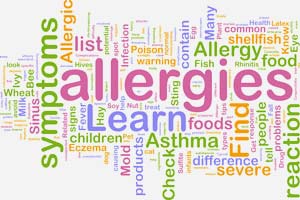Allergy News
The Australasian Society of Clinical Immunology and Allergy (ASCIA)…
Allergy Test Scam
26/3/2019 Allergy Test Australia: Anybody have experience with or using this company?

The Australasian Society of Clinical Immunology and Allergy (ASCIA)…
26/3/2019 Allergy Test Australia: Anybody have experience with or using this company?
Allergy problems occur in 1 in 3 people in Australia. It has approximately doubled in the last 30 years.
Common symptoms of an allergic reaction to inhaled or skin allergens include:
The severity of an allergic reaction’s symptoms can vary widely:
The most severe allergic reaction is called anaphylaxis. In anaphylaxis, allergens cause a whole-body allergic reaction that can include:
Anaphylaxis is life-threatening and requires immediate medical attention. Symptoms can progress rapidly, so call 000 immediately if there’s any suspicion of anaphylaxis.
The most important step in allergy management is correctly identifying the cause
Allergy Doctors provide professional, proven and accessible solutions to your allergy problems.




